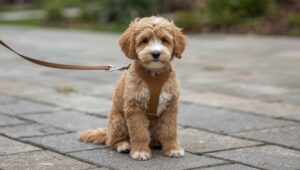Mini Golden Retriever: The Perfect Compact Companion for Modern Families

The Mini Golden Retriever has captured hearts worldwide as a delightful scaled-down version of America’s beloved Golden Retriever. This charming hybrid combines the gentle nature of Golden Retrievers with the practicality of a smaller size, making them ideal companions for various living situations.
Table of Contents
What is a Mini Golden Retriever?
A Mini Golden Retriever is a carefully bred hybrid that combines the classic Golden Retriever with smaller breeds, typically Poodles or Cocker Spaniels. A Mini Golden Retriever is a mix between two incredible dog breeds – the classic Golden Retriever and another smaller breed, usually a Cocker Spaniel or a Poodle. These dogs maintain the beloved characteristics of traditional Golden Retrievers while offering a more manageable size for modern living.
The breeding process aims to preserve the Golden Retriever’s exceptional temperament while achieving a more compact frame. Reputable breeders try to maximize the amount of Golden Retriever in the mix, aiming for 50% to 75% Retriever lineage to maintain that Goldie feel.
Size and Physical Characteristics
Height and Weight Statistics
Mini Golden Retrievers typically weigh between 20-45 pounds and stand 12-20 inches tall at the shoulder, significantly smaller than their full-sized counterparts who weigh 55-75 pounds. This size reduction makes them perfect for apartments, condos, and homes with limited space while maintaining the Golden Retriever’s distinctive appearance.
The exact size can vary depending on which breeds were used in the crossing and the specific generation of the hybrid. First-generation Mini Golden Retrievers may show more variation in size compared to later generations where breeding becomes more standardized.
Coat and Appearance
Mini Golden Retrievers inherit the iconic golden coat that made their larger relatives famous. Their fur typically ranges from light cream to deep golden colors, often with the characteristic feathering on the legs, chest, and tail. The coat may be slightly different in texture due to Poodle genetics, potentially offering reduced shedding benefits.
Temperament and Personality Traits
Intelligence and Trainability
Mini Golden Retrievers display remarkable intelligence inherited from both parent breeds. Golden Retrievers consistently rank among the most intelligent dog breeds, and this trait transfers beautifully to their miniature versions. This combination of Golden Retriever, Poodle, and Cocker Spaniel creates a dog that is affectionate, intelligent, playful, kind, social and sheds less and is easy to train.
These dogs excel in obedience training, agility courses, and even therapy work. Their eager-to-please nature combined with high intelligence makes them suitable for first-time dog owners and experienced handlers alike.
Family Compatibility
Mini Golden Retrievers maintain the friendly, gentle nature that makes Golden Retrievers excellent family pets. They typically display patience with children, sociability with other pets, and welcoming attitudes toward visitors. Generally, both types are social, loyal, and excellent family pets.
“The Mini Golden Retriever brings all the love and loyalty of a full-sized Golden in a perfectly sized package for any home,” notes canine behaviorist Dr. Sarah Martinez.
Health Statistics and Lifespan
Life Expectancy Data
Mini Golden Retrievers generally enjoy longer lifespans than their full-sized counterparts, typically living 12-15 years compared to the 10-12 year lifespan of standard Golden Retrievers. This increase in longevity often results from hybrid vigor and the influence of smaller breed genetics.
Common Health Concerns
Like their larger relatives, Mini Golden Retrievers can be prone to certain health conditions. Common health issues for both mini and full-size Golden Retrievers include hip dysplasia, heart problems, and eye conditions. However, responsible breeding practices help minimize these risks.
The most frequently reported health issues include:
- Hip dysplasia (affects approximately 15-20% of the breed)
- Progressive retinal atrophy
- Heart conditions
- Allergies and skin sensitivities
Regular veterinary checkups, proper nutrition, and maintaining healthy weight significantly contribute to preventing or managing these conditions.
Care Requirements and Maintenance
Exercise Needs
Mini Golden Retrievers require moderate exercise, typically needing 30-60 minutes of daily activity. Their smaller size means they can meet exercise requirements through indoor play, short walks, and backyard activities, making them suitable for urban living situations.
“These dogs have the energy of a Golden Retriever in a compact package – they need mental and physical stimulation but are much more manageable in smaller spaces,” explains professional dog trainer Jennifer Walsh.
Grooming Requirements
Regular brushing 2-3 times per week helps maintain their coat and reduces shedding. Mini Golden Retrievers benefit from professional grooming every 6-8 weeks, including nail trims, ear cleaning, and coat maintenance. Their grooming needs are generally less intensive than full-sized Golden Retrievers due to their smaller surface area.
Training and Socialization
Early Development
Early socialization is crucial for Mini Golden Retriever puppies. Exposing them to various people, animals, environments, and experiences during their first few months creates well-adjusted adults. Their intelligent and social nature makes them responsive to positive reinforcement training methods.
Advanced Training Opportunities
Many Mini Golden Retrievers excel in advanced training activities including agility, therapy work, and competitive obedience. Their combination of intelligence, eagerness to please, and manageable size makes them excellent candidates for various canine sports and service roles.
Feeding and Nutrition Guidelines
Dietary Requirements
Mini Golden Retrievers typically consume 1-2 cups of high-quality dry food daily, divided into two meals. Their smaller size means lower food costs compared to full-sized Golden Retrievers, making them more economical to maintain.
Proper nutrition should focus on high-quality proteins, balanced fats, and appropriate carbohydrates. Avoiding overfeeding is crucial as excess weight can exacerbate potential joint problems and reduce overall health.
Finding a Responsible Breeder
What to Look For
When searching for Mini Golden Retriever puppies, prioritizing reputable breeders who conduct health testing on parent dogs is essential. Responsible breeders should provide health clearances, allow visits to meet parent dogs, and offer ongoing support throughout the dog’s life.
Research breeders thoroughly through golden retriever guides and verify their credentials through breed organizations and veterinary references.
Cost Considerations
Mini Golden Retriever prices typically range from $1,500-$4,000 depending on breeding quality, location, and breeder reputation. While initial costs may seem significant, their smaller size often results in lower lifetime expenses for food, medications, and some veterinary procedures.
Living Arrangements and Adaptability
Apartment Living
Mini Golden Retrievers adapt well to apartment living when provided adequate exercise and mental stimulation. Their moderate size and generally calm indoor demeanor make them suitable for various living situations, from urban apartments to suburban homes.
Climate Considerations
These dogs typically handle various climates well, though their coat provides better cold weather protection than heat tolerance. Summer months may require extra attention to prevent overheating, especially during exercise periods.
For comprehensive information about optimal living conditions, consult resources like Dogster for detailed care guides.
Conclusion
The Mini Golden Retriever represents an excellent compromise for families seeking the beloved Golden Retriever temperament in a more manageable size. With their intelligence, friendly nature, longer lifespan, and adaptability to various living situations, these remarkable dogs offer the perfect solution for modern families. Their moderate exercise needs, combined with their affectionate personalities and reduced space requirements, make them increasingly popular among dog enthusiasts. Whether you’re a first-time dog owner or an experienced handler looking for a compact companion, the Mini Golden Retriever might be the perfect addition to your family. But with so many wonderful qualities packed into such a small package, isn’t it time you considered whether a Mini Golden Retriever could be the ideal four-legged family member you’ve been searching for?






